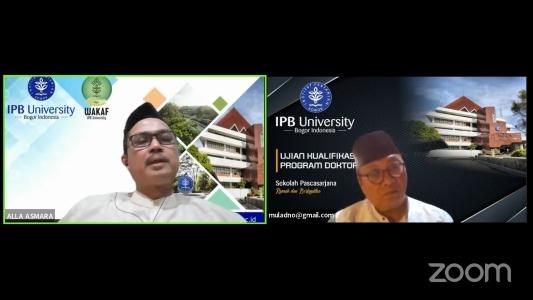Productive Livestock Endowments, Concrete Evidence of BP Biswaf IPB University for the Achievement of Sustainable Development Goals

The Business, Investment and Waqf Management Agency (BP Biswaf) inaugurated a food security waqf program that aims to improve the welfare of people while achieving sustainable development targets (SDGs). Efforts are made by allocating endowments not only for campus infrastructure, but also in the livestock sector.
This food security waqf program is in the form of productive livestock endowments directed at empowering farmers through increasing farmer productivity and welfare. This program is in collaboration with the Indonesian Waqf Board (BWI) and the Indonesian People's Breeders School Alumni Solidarity (SASPRI).
"This productive livestock endowment is aimed at achieving SDGs to alleviate poverty, hunger, including building economic growth, as well as responsible production and consumption," said Dr Alla Asmara, Vice Head of BP Biswaf for Investment and Waqf Management.
This IPB University lecturer from the Faculty of Economics and Management (FEM) added, in the preparation of the waqf program at IPB University, his party always strives for the program developed to have a maximum impact, especially in achieving SDGs.
According to him, the difference with other farmer empowerment programs is that this money-based waqf is distributed to farmers who have been fostered by Prof. Muladno, Professor of IPB University from the Faculty of Animal Science and the originator of the People's Animal Husbandry School (SPR).
"The hope is that farmers can cultivate cows well and optimally, building the value of honesty and hard work in farmers. Acting not only as a beneficiary, but as a key player who can provide benefits in the next phase," he continued during the Baitu Izzah Study (BAIZ), (16/4) entitled 'Waqf for Sustainable Development Goals'.
He elaborated, the portion of profits obtained from the program amounted to 65 percent for farmers. While 35 percent is distributed for student scholarship assistance.
"Therefore, he emphasized, the position of farmers is very important in this empowerment program. Every party involved is strived to be part of the chain of goodness," he said.
Prof Muladno as the initiator of SPR welcomed the IPB University waqf program which was directed at the welfare of smallholder farmers. "This effort must be mobilized as the real strength of the nation and a concrete example of the benefits of waqf for the livestock community," he said. (MW/Rz) (IAAS/ANF)



